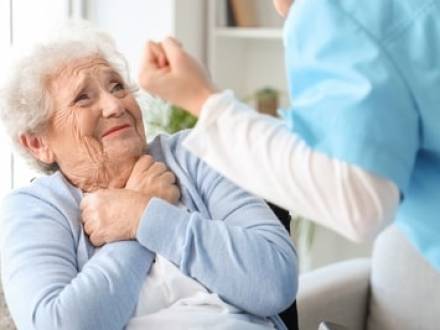Who Are the Most Vulnerable Victims of Nursing Home Abuse?
 Nursing home abuse is a sad reality of our times. When you are forced to place your elderly loved one in a nursing home, it can be emotionally heart-wrenching. However, you expect your loved one to be treated with respect, dignity, and kindness while being properly cared for. Elder abuse is defined as intentional or negligent acts by caregivers or others entrusted with the care of an elderly person that cause harm or serious risk of harm.
Nursing home abuse is a sad reality of our times. When you are forced to place your elderly loved one in a nursing home, it can be emotionally heart-wrenching. However, you expect your loved one to be treated with respect, dignity, and kindness while being properly cared for. Elder abuse is defined as intentional or negligent acts by caregivers or others entrusted with the care of an elderly person that cause harm or serious risk of harm.
With more than three million older adults living in nursing home facilities across the nation – and many more expected as baby boomers continue to age – incidences of nursing home abuse will likely also rise. While any resident in a nursing home can be a victim of abuse, some are more vulnerable than others, thus more likely to experience abuse. If you suspect your loved one is the victim of nursing home abuse or neglect, speaking with an experienced Chicago, IL nursing home abuse attorney from Winters Salzetta O'Brien & Richardson, LLC can be extremely beneficial.
What Makes a Nursing Home Resident More Vulnerable to Abuse and Neglect?
Gender is often an indicator of whether an elderly person will be a victim of nursing home abuse or neglect. Women tend to be much more at risk - 64 percent of nursing home abuse victims are female. Elderly women may be frailer than their male counterparts, but perhaps one of the primary reasons that elderly women are more vulnerable than men is that women, in general, are less likely to tell someone about the abuse. Women fear getting the abuser in trouble or fear retribution. They are also more likely than men to think nobody will believe them.
Socioeconomic factors may also determine which residents are more likely to be abused or neglected. Those who rely on Medicaid to pay for their care are more likely to be placed in an understaffed facility. The facilities that provide higher-quality care usually only take wealthy residents who can pay out-of-pocket. Elderly patients with dementia or Alzheimer’s, along with those in really poor mental health, have a higher risk of nursing home abuse.
Almost half of all elderly patients with dementia have experienced abuse or neglect in a nursing home. If there is such a thing as a "perfect victim," those with dementia fall into that category. They are often unable to communicate complaints to loved ones, and if they are able, they are likely to be disbelieved. Nursing home residents whose family members visit rarely or live far away are considerably more likely to experience nursing home abuse than those who have frequent visitors and phone calls from friends and family.
Nursing home residents who are in their late 70s and older tend to be less alert and aware of their bodies and their surroundings, making them targets of abusers. A nursing home resident’s disposition can also influence his or her risk of abuse. Caregivers are much more likely to immediately shift to physical force when dealing with a resident who exhibits the slightest level of aggression.
What Are the Four Types of Nursing Home Abuse?
There are four primary types of nursing home abuse:
- Physical abuse involves the intentional use of physical force with the intention of hurting or frightening an elderly patient. Physical abuse included kicking, pinching, shoving, hitting, slapping, and tripping elderly patients.
- Sexual abuse is forced sexual interactions of any kind with an elderly patient.
- Emotional abuse involves verbal or non-verbal attacks that leave an elderly patient distressed, mentally or emotionally anguished, fearful, or humiliated.
- Financial abuse encompasses the unauthorized use of an elderly person’s checking account or credit card or selling the person’s possessions without his or her permission.
Contact a Chicago, IL Nursing Home Abuse Lawyer
Nursing home abuse can be devastating for the victim as well as for his or her loved ones. Speaking to a Chicago, IL nursing home abuse attorney from Winters Salzetta O'Brien & Richardson, LLC ensures your loved one will receive justice. While money does not take away the physical and emotional harm of abuse, it can ensure higher quality care in the future. Call 312-236-6324 to schedule your free consultation to discuss your situation.





 312-236-6324
312-236-6324




 312-236-6324
312-236-6324 312-236-6426
312-236-6426


